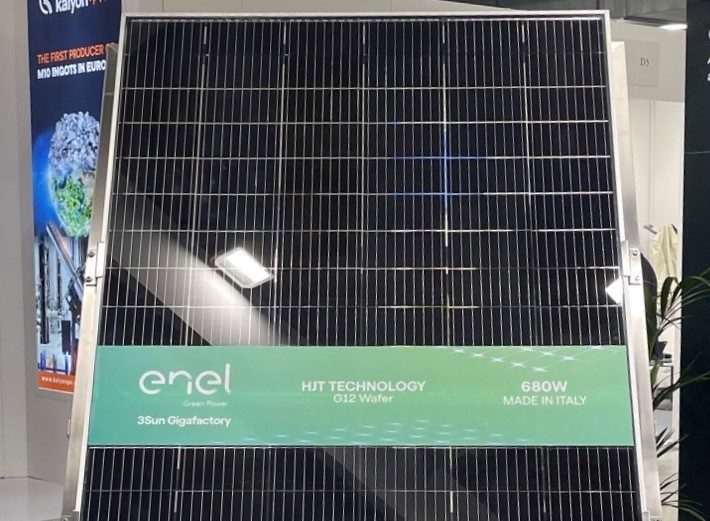From pv magazine Global
Enel Green Power (EGP), a unit of Italian utility Enel, unveiled its newest solar panel at the 8th World Conference on Photovoltaic Energy Conversion this week in Milan, Italy.
The new product is a heterojunction bifacial panel for applications in utility-scale PV projects. It is based on an n-type solar cell with G12 format and a power conversion efficiency of 24.6%.
“Production will begin in September 2023 with the first 400 MW production line of our 3Sun Factory in Catania, Sicily, southern Italy,” the head of 3Sun, Eliano Russo, told pv magazine. “The cell efficiency was certified by the Institute for Solar Energy Research Hamelin (ISFH) in Germany. According to our roadmap, however, we should be able to increase the efficiency to 25% efficiency in 2025 and over 26% in the second half of 2026.”
The cell has currently a thickness of 150 µm, but the company’s roadmap has set a target of 120 µm by the end of 2025.
“Our cell is flexible and, compared to TOPCon and PERC cells, has a higher resistance to mechanical stress,” Russo explained. “We conducted several tests which showed that if microcracks arise, they don’t expand as significantly as in PERC cells.”
The new panel is available in nine versions, with power outputs ranging from 640 W to 680 W and average efficiency spanning from 22.6% to 22.9%. The open-circuit voltage is between 43.3 V and 44.2 V and the short-circuit current ranges from 18.9 A to 19.8 A.
All versions of the solar module measure 2,172 mm × 1,303 mm × 35 mm and weigh in at 36 kg. The maximum system voltage is 1,500 V and the bifaciality reaches 95%. The panel can be used in operating temperatures ranging from -40 C to 85 C, with an operating temperature coefficient of -0.24% per degree Celsius. It is enclosed between 2 mm solar glass with anti-reflective treatment, and also features a junction box with an IP 68 rating and an anodized aluminum frame.
The new products come with 30-year linear power output guarantees and 20-year product guarantees. The degradation in the first year is purportedly 1.0% and 30-year end power output is guaranteed to be no less than 93% of the nominal output power.
“The factory will start operations around September 2023,” Russo said, noting that the factory’s capacity at that time will be around 400 MW. “The levelized cost of energy (LCOE) of our panel allows us to tackle the market while ensuring remarkable profitability.”
EGP will initially target the European market, where it is obliged to sell up to 60% of its products, as it has received a significant amount of funding from the European Union.
“We are also targeting non-European markets such as the United States, Latin America, and Asia, and we may also consider opening new factories abroad,” Russo said. “By choosing the heterojunction technology, we decided to bet on technology and innovation, but we are also considering increasing our scale. All the economies of scale which we can capture will only increase our competitiveness.”
Enel is investing €600 million ($579.4 million) in the expansion of its 3Sun facility. Out of that amount, €188 million euros are expected to be provided by European Commission and the Italian government through grants coming from the Innovation Fund and National Recovery and Resiliency Plan (NRRP).
EGP started production at the 200 MW facility in October 2019. It invested around €80 million in reviving the factory, which was built in 2011 with Japanese electronics manufacturer Sharp and French-Italian semiconductor business STMicroelectronics. Enel took full control of the facility in July 2014. At the time, the factory was intended to produce multi-junction, thin-film silicon PV modules.
*The article was amended on September 26 to reflect that the company offers a 30-year performance warranty for the product.
This content is protected by copyright and may not be reused. If you want to cooperate with us and would like to reuse some of our content, please contact: editors@pv-magazine.com.









By submitting this form you agree to pv magazine using your data for the purposes of publishing your comment.
Your personal data will only be disclosed or otherwise transmitted to third parties for the purposes of spam filtering or if this is necessary for technical maintenance of the website. Any other transfer to third parties will not take place unless this is justified on the basis of applicable data protection regulations or if pv magazine is legally obliged to do so.
You may revoke this consent at any time with effect for the future, in which case your personal data will be deleted immediately. Otherwise, your data will be deleted if pv magazine has processed your request or the purpose of data storage is fulfilled.
Further information on data privacy can be found in our Data Protection Policy.